- Home
- Jim Butcher
Ghost Story df-13 Page 2
Ghost Story df-13 Read online
Page 2
I eyed Carmichael.
“I stand by my statement,” said Carmichael. He looked at Jack and hooked a thumb at the door. “I should get back to that rakshasa thing.”
Jack said, “Go.”
Carmichael slapped my arm and said, “Good luck, kid. Have fun.” And he strode out, moving like a man on a mission. That left me sharing an awkward silence with Jack.
“This isn’t what I expected out of the afterlife,” I said.
“That’s because it isn’t,” he said.
I frowned. “Well, you said I was dead. Ergo, afterlife.”
“You’re dead,” Jack said. “This is between.”
I frowned. “What, like . . . purgatory?”
Jack shrugged. “If that works for you, call it that. But you aren’t here because you need to cleanse yourself. You’re here because there was an irregularity with your death.”
“I got shot. Or drowned. Ain’t exactly rare.”
Jack lifted a big, square hand and waggled it back and forth. “It isn’t about the physical. It’s about the spiritual.”
I frowned. “Spiritual?”
“The opposition,” Jack said. “You died because they cheated.”
“Wait. What opposition?”
“The angel standing guard at the elevator is what we cops think of as a clue. You need me to draw you some pictures?”
“Um. Hell, you mean? Like . . . actual Fallen angels?”
“Not exactly. But if you want to think of it that way, it works. Sort of. What you need to know is that they’re the bad guys.”
“That’s why I’m here,” I said. “Because they . . . broke some sort of cosmic rule?”
“You were getting in their way. They wanted you gone. They broke the law to make it happen. That makes you my problem.”
I frowned at him and looked down at myself. I noticed idly that I was wearing jeans, a plain black T-shirt, and my black leather duster—which had been torn to shreds and consigned to the waters of the lake an hour or three before I got shot. I mean, my duster had died.
But I was wearing it, whole and good as new.
Which was when it really, really hit me.
I was dead.
I was dead.
Chicago, the White Council, my enemies, my friends, my daughter . . . They were all gone. Obsolete. And I had no idea whatsoever what was going to happen to me next. The room felt like it started spinning. My legs started shaking. I sat down on a chair opposite Jack’s seat.
I felt his steady regard on me, and after a moment he said quietly, “Son, it happens to all of us. It’s hard to face, but you gotta relax and focus, or there’s nothing I can do for you.”
I took some deep breaths with my eyes closed—and noticed for the first time how absolutely incredible I felt physically. I felt like I had when I was a kid, when I was full of energy and the need to expend it doing something enjoyable. My limbs felt stronger, quicker, lighter.
I looked at my left hand and saw that it was no longer covered in scar tissue from the burns I’d received years ago. It was whole, as if it had never been harmed.
I expanded the logic and realized that I didn’t actually feel all that incredible—I was simply missing an entire catalog of injuries and trauma. The faded, years-old scar I’d given myself on my right forearm, when my knife had slipped while cleaning the fish my grandfather and I had caught, was missing also.
The constant, slowly growing level of aches and pains of the body was simply gone. Which made sense enough, since my body was gone, too.
The pain had stopped.
I mopped at my face with my hand and said, “Sorry. It’s just a lot to take in.”
The smile appeared again. “Heh. Just wait.”
I felt irritated at his tone. It was something to hang on to, and I planted my metaphoric heels and dragged the spinning room to a stop.
“So, who are you?” I asked. “And how can you help me?”
“You want to call me something, call me Captain. Or Jack.”
“Or Sparrow?” I asked.
Jack looked at me with a cop face that showed nothing but the vague hint of disapproval. He reached across the desk and slid a file folder to the blotter in front of him. He opened it and scanned the contents. “Look, kid, you’re stuck here. You aren’t going anywhere until we get this discrepancy sorted out.”
“Why not?”
“Because what comes after isn’t for people who are rubbernecking over their shoulders or bitching about how unfair they had it,” Jack said, his expression frank. “So, we sort out how you got screwed over. Then you get to move on to what’s next.”
I thought of being trapped in the hollow shell of the city outside and shuddered. “Okay. How do we fix it?”
“You go back,” Jack said. “And you catch the scum who did you.”
“Back?” I said. “Back to . . .”
“Earth, yeah,” Jack said. “Chicago.” He closed the folder and dropped it into his out-box. “You gotta find out who killed you.”
I arched an eyebrow at him. “You’re kidding.”
He stared at me, his expression as jovial as a mountain crag.
I rolled my eyes. “You want me to solve my own murder?”
He shrugged. “You want a job here instead, I can set you up.”
“Augh,” I said, shuddering again. “No.”
“Okay,” he said. “Any questions?”
“Uh,” I said. “What do you mean when you say you’re sending me back? I mean . . . back to my body or . . . ?”
“Nah,” he said. “Isn’t available. Isn’t how it works. You go back as you are.”
I frowned at him and then down at myself. “As a spirit,” I said.
He spread his hands, as if I had just comprehended some vast and weighty truth. “Don’t hang around for sunrise. Watch out for thresholds. You know the drill.”
“Yeah,” I said, disturbed. “But without my body . . .”
“Won’t have much magic. Most people can’t see you, hear you. Won’t be able to touch things.”
I stared at him. “How am I supposed to find anything out like that?” I asked.
Jack lifted both hands. “Kid, I don’t make the law. I make sure it gets observed.” He squinted at me. “Besides. I thought you were a detective.”
I clenched my jaw and glared at him. My glare isn’t bad, but he wasn’t impressed. I exhaled slowly and then said, “Solve my own murder.”
He nodded.
Anger rose from my chest and entered my voice. “I guess it isn’t enough that I spent my adult life trying to help and protect people. There’s something else I have to do before going off to meet Saint Peter.”
Jack shrugged. “Don’t be so certain about that. With your record, son, you might just as easily find yourself on a southbound train.”
“Hell,” I spat. “You know what Hell is, Captain Sparrow? Hell is staring at your daughter and knowing that you’ll never get to touch her again. Never get to speak to her. Never get to help her or protect her. Bring on the lake of fire. It wouldn’t come close.”
“In point of fact,” Jack said calmly, “I do know what Hell is. You aren’t the only dead guy with a daughter, Dresden.”
I sank back into my chair, frowning at him, and then turned my head to stare past him to a simple landscape painting on the wall.
“If it makes any difference,” Jack said, “three of the people you love will come to great harm unless you find your murderer.”
“What do you mean, harm?” I asked.
“Maimed. Changed. Broken.”
“Which three people?” I asked.
“Can’t tell you that,” he said.
“Yeah,” I muttered. “I bet you can’t.”
I thought about it. Maybe I was dead, but I was sure as hell not ready to go. I had to make sure the people who’d helped me take on the Red King were taken care of. My apprentice, Molly, had been badly wounded in the battle, but that wasn’t her biggest pro
blem. Now that I was dead, there was nothing standing between her and a summary beheading at the hands of the White Council of Wizards.
And my daughter, little Maggie, was still back there. I’d deprived her of a mother, just as someone else had deprived her of a father. I had to make sure she was taken care of. I needed to tell my grandfather good-bye . . . and Karrin.
God. What had Karrin found when she came back to the boat to pick me up? A giant splatter of blood? My corpse? She was misguided and stubborn enough that I was sure she would blame herself for whatever had happened. She’d tear herself apart. I had to reach her somehow, and I couldn’t do that from this spiritual Siberia.
Could they be the ones the captain was talking about? Or was it someone else?
Dammit.
My self might have felt full of energy and life, but my mind was weary almost beyond measure. Hadn’t I done enough? Hadn’t I helped enough people, rescued enough prisoners, defeated enough monsters? I’d made enemies of some of the deadliest and most evil things on the planet, and fought them time and again. And one of them had killed me for it.
Rest in peace, it says on all those tombstones. I’d fought against the rising tide until it had literally killed me. So where the hell was my rest? My peace?
Three of the people you love will come to great harm unless you find your murderer.
My imagination conjured scenes filled with the anguish of the people I cared most about. Which pretty much settled things. I couldn’t allow something like that to happen.
Besides, there was one more thing that made me certain that I wanted to go back. At the end of the day . . . some son of a bitch had freaking killed me.
That’s not the kind of thing you can just let stand.
And if it would let me get out of this place and let me move on to wherever it was I was supposed to go, that was a nice bonus.
“Okay,” I said quietly. “How does it work?”
He slid a pad and a piece of paper across the desk at me, along with a pencil. “You get to go to an address in Chicago,” he said. “You write it there. Driver will drop you off.”
I took the pad and paper and frowned at it, trying to work out where to go. I mean, it wasn’t like I could show up just anywhere. If I was going in as a pure spirit, it would be futile to contact any of my usual allies. It takes some serious talent to see a spirit that hasn’t manifested itself, the way a ghost can occasionally appear to the physical eye. My friends wouldn’t even know I was there.
“Out of curiosity,” I said, “what happens if I don’t catch the killer?”
His expression turned sober and his voice became quieter. “You’ll be trapped there. Maybe forever. Unable to touch. Unable to speak. Watching things happen in the world, with no ability whatsoever to affect them.”
“Hell,” I said quietly.
“Hell.”
“That’s cheerful.”
“You’re dead, son,” Jack said. “Cheer is contraindicated.”
I nodded.
I was looking at one hell—ba-dump-bump-ching—of a risk. I mean, fitting in here in Chicago-tory might not be fun, but it probably wouldn’t be torture, either. Judging from what Carmichael and Jack had said and from the way they went about their business, they were able to act in some fashion, maybe even do some good. They didn’t look particularly thrilled to be doing what they were doing, but they carried that sense of professional purpose with them.
A ghost trapped on the mortal coil? That would be far worse. Always present, always watching, and always impotent.
I never really developed my Don’t-Get-Involved skills. I’d go crazy in a year, and wind up one more pathetic, insane, trapped spirit haunting the town I’d spent my adult life protecting.
“Screw it,” I said, and started writing on the paper. “If my friends need me, I have to try.”
Jack took the pad back with a nod of what might have been approval. Then he stood up and pulled on his suit coat. Car keys rattled in his hand. He was only medium height, but he moved with a confidence and a tightly leashed energy that once more made him seem familiar, somehow. “Let’s go.”
Several of the cops—because I was sure they were cops, or at least were doing something so similar that the word fit—nodded to Jack as he went by.
“Hey,” called someone from behind us. “Murphy.”
Jack stopped and turned around.
A guy wearing a suit that would have looked at home in the historic Pinkerton Detective Agency came over to Jack with a clipboard and held it out along with a pen. Jack scanned what was on it, signed off, and passed the clipboard back to the man.
Jack resumed his walking speed. I stuck my hands in my duster pockets and stalked along beside him.
“Captain Collin J. Murphy?” I asked quietly.
He grunted.
“You’re Karrin’s dad. Used to run the Black Cat case files.”
He didn’t say anything. We went down the elevator, past the guard angel, and out to the street, where an old blue Buick Skylark, one with tail fins and a convertible roof, sat waiting by the curb. He went around to the driver’s side and we both got in. The rain drummed on the roof of the car.
He sat behind the wheel for a moment, his eyes distant. Then he said, “Yeah.”
“She’s talked about you.”
He nodded. “I hear you’ve looked out for my Karrie.”
Karrie? I tried to imagine the person who would call Murphy that to her face. Rawlins had done it once, but only once, and not only was he her partner, but he’d also worked with her dad when she was a little girl. Rawlins was practically family.
Anyone else would need to be a Terminator. From Krypton.
“Sometimes,” I said. “She doesn’t need much in the way of protection.”
“Everyone needs someone.” Then he started the car, the engine coming to life with a satisfying, throaty purr. Jack ran his hand over the steering wheel thoughtfully and looked out at the rain. “You can back out of this if you want, son. Until you get out of this car. Once you do that, you’ve chosen your path—and whatever comes with it.”
“Yep,” I said, and nodded firmly. “The sooner I get started, the sooner I get done.”
His mouth quirked up at one corner and he nodded, making a grunting sound of approval. He peered at the pad, read the address I’d written, and grunted. “Why here?”
“Because that’s where I’ll find the one person in Chicago I’m sure can help me,” I said.
Captain Murphy nodded. “Okay,” he said. “Let’s go.”
Chapter Three
Captain Murphy’s old Skylark stopped in a residential area up in Harwood Heights, a place that still looked as empty and hollow as the rest of the city. It was an odd home, for Chicago—a white stucco number with a red tile roof that looked like it had been transplanted from Southern California. In the steady rain and the mournful grey light of the streetlamps it stood, cold, lonely, and empty of purpose among the more traditional homes that surrounded it.
The Buick’s windshield wipers thumped rhythmically.
“Once you get out,” said Captain Murphy, “there’s no coming back. You’re on your own.”
“Been there, done that,” I said. I offered him my hand. “Thank you, Captain.”
He traded grips with me. I didn’t try to outcrush him. He didn’t try to crush me. The men who can really handle themselves rarely do.
I wished Captain Murphy had lived long enough for me to meet him in the real world. I had a feeling he’d have made one hell of an ally.
“I might be in touch with Karrin,” I said.
“No messages. I’ve done her enough harm,” he said, almost before I had finished speaking. His voice carried a tone of unquestionable finality. He nodded toward the house. “But you can tell the big fellow over there that I sent you. It might help.”
I nodded. Then I took a deep breath, opened the door of the car, and stepped out into—
I was more impressed with what
I hadn’t stepped into, for a moment. Because when my feet hit the ground and the car door shut behind me, I wasn’t standing in Chicago’s rainy, abandoned corpse. Instead, I was on a city street on a cold, clear evening. No rain fell. The stars and moon burned bright overhead, and the ambient city light combined with a fairly fresh and heavy snowfall to make it nearly as bright as daylight outside.
Sounds rushed all around me. Traffic, distant horns, the thumping beat of music from a large stereo. A jet’s passage left a hollow roar behind it—I was standing only a few miles from O’Hare.
I turned to look behind me, but Captain Murphy’s car had vanished, back into Chicago Between, presumably.
I stood there alone.
I sighed. Then I turned and walked onto the property of Mortimer Lindquist, ectomancer.
Once upon a time, Morty had covered his lawn with decorations meant to be intimidating and spooky. Headstones. A wrought-iron fence with a big metal gate. Eerie lighting. The overall impression could be scary if you were gullible enough and the lighting was low, but mostly it had looked like cheap Halloween decorations outside a crack house.
Times had changed.
Morty had gotten rid of all the cheap junk, except for the fence. He’d turned his front yard into a Japanese garden. There were a few hedges, and a koi pond complete with a little wooden bridge that spanned it. Raised planters everywhere contained bonsai, all of them trees native to North America. It was a little unnerving to see what looked like an adult oak tree—only fifteen inches high and complete with miniature leaves.
There weren’t a lot of people in Chicago doing that for money, which implied that it was Morty’s own handiwork. If so, it had taken him a lot of effort and patience to create those.
I walked forward calmly, reaching out to open the gate.
My hand went right through it.
Yeah, I know, I was essentially a ghost, but I’d never gotten much practice with intangibility. I was used to reaching out for objects and being able to touch them. Now my hand simply tingled, as if waking up after I’d taken a nap and used it as a pillow. I pushed my arm a little farther forward, leaning to one side, and saw my fingertips emerge from the metal of the gate. I waggled my fingers, just to be sure.

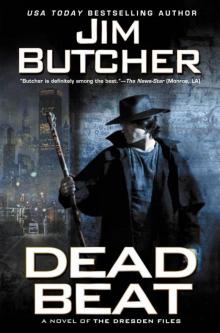 Dead Beat
Dead Beat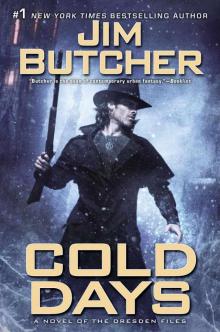 Cold Days
Cold Days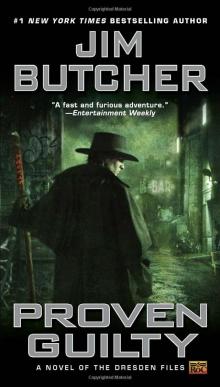 Proven Guilty
Proven Guilty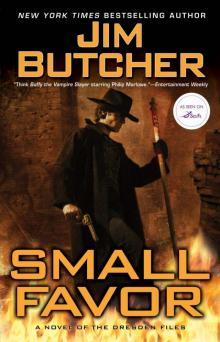 Small Favor
Small Favor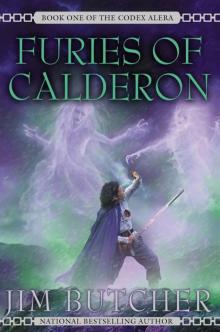 Furies of Calderon
Furies of Calderon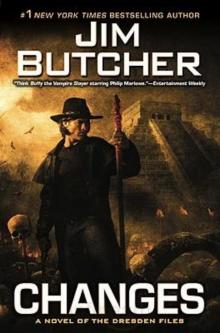 Changes
Changes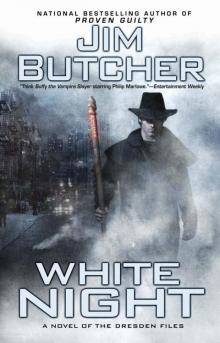 White Night
White Night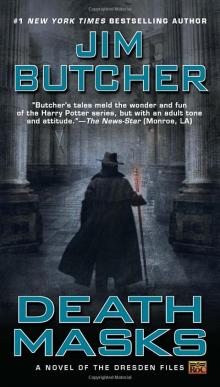 Death Masks
Death Masks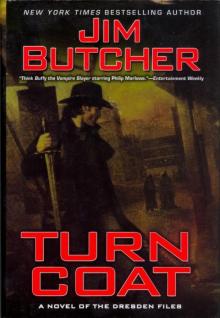 Turn Coat
Turn Coat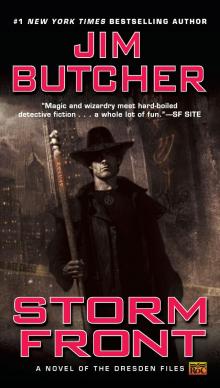 Storm Front
Storm Front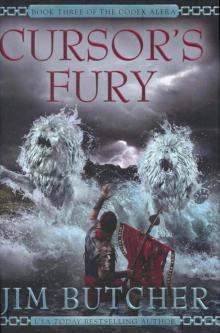 Cursor's Fury
Cursor's Fury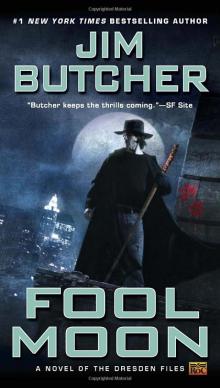 Fool Moon
Fool Moon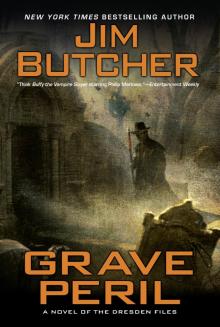 Grave Peril
Grave Peril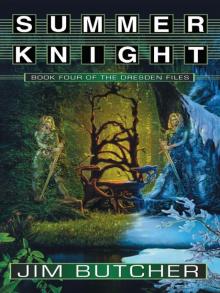 Summer Knight
Summer Knight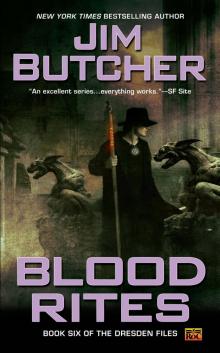 Blood Rites
Blood Rites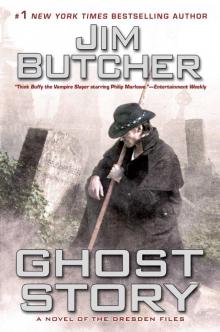 Ghost Story
Ghost Story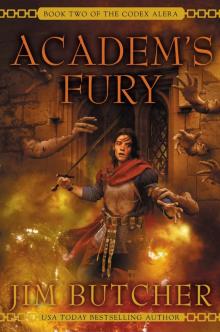 Academs Fury
Academs Fury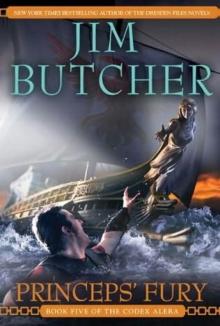 Princeps' Fury
Princeps' Fury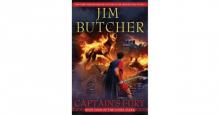 Captains Fury
Captains Fury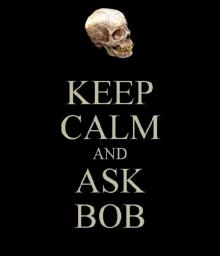 Jim Butcher - Dresden Files Omnibus
Jim Butcher - Dresden Files Omnibus Christmas Eve
Christmas Eve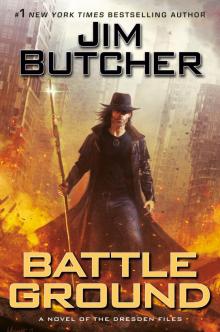 Battle Ground
Battle Ground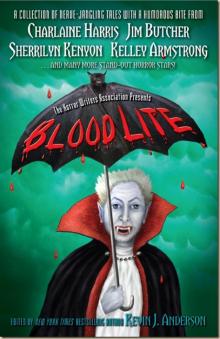 Blood Lite
Blood Lite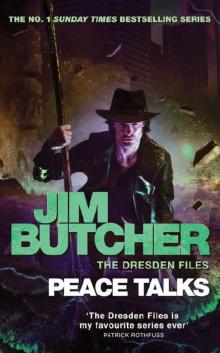 Peace Talks
Peace Talks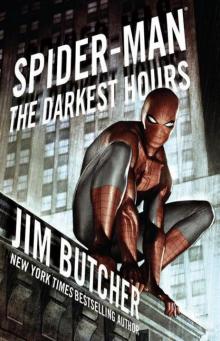 Spider-Man - The Darkest Hours
Spider-Man - The Darkest Hours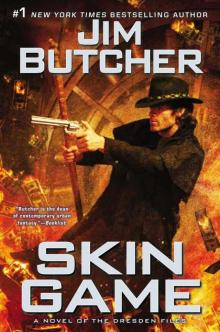 Skin Game
Skin Game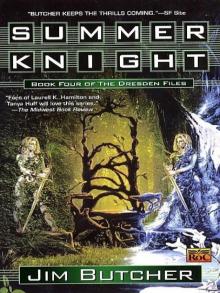 The Dresden Files 4: Summer Knight
The Dresden Files 4: Summer Knight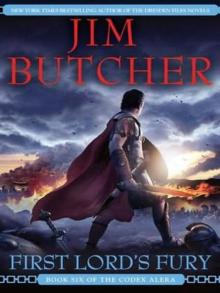 First Lord's Fury ca-6
First Lord's Fury ca-6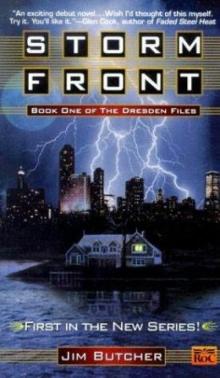 Storm Front df-1
Storm Front df-1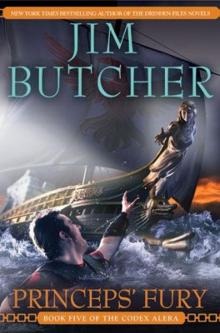 Princeps Fury ca-5
Princeps Fury ca-5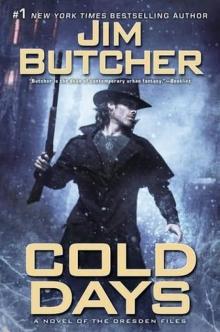 Cold Days df-14
Cold Days df-14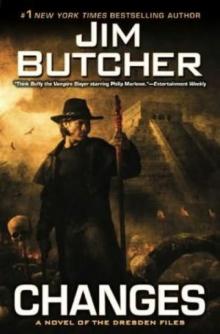 Changes df-12
Changes df-12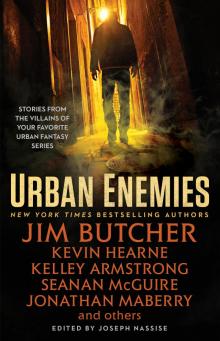 Urban Enemies
Urban Enemies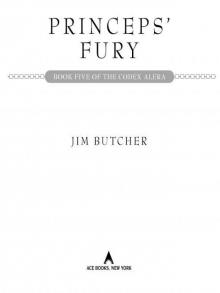 Princeps' Fury (Codex Alera)
Princeps' Fury (Codex Alera)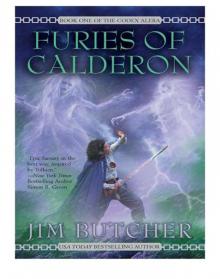 Codex Alera 01 - Furies of Calderon
Codex Alera 01 - Furies of Calderon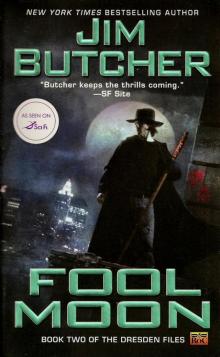 Dresden Files 02 - Fool Moon
Dresden Files 02 - Fool Moon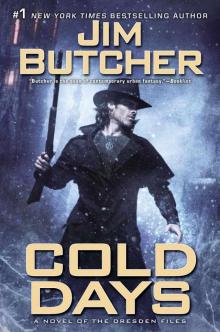 Cold Days: A Novel of the Dresden Files
Cold Days: A Novel of the Dresden Files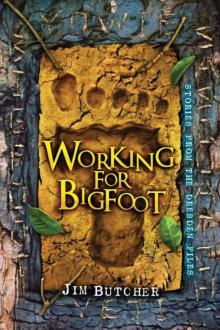 Working for Bigfoot
Working for Bigfoot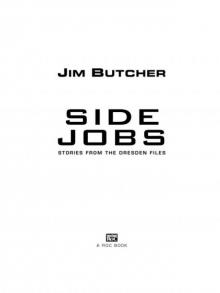 Side Jobs
Side Jobs Even Hand
Even Hand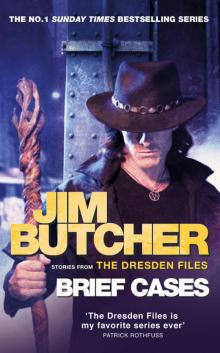 Brief Cases: The Dresden Files
Brief Cases: The Dresden Files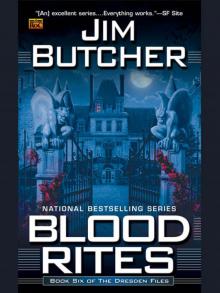 Blood Rites: Book Six of the Dresden Files
Blood Rites: Book Six of the Dresden Files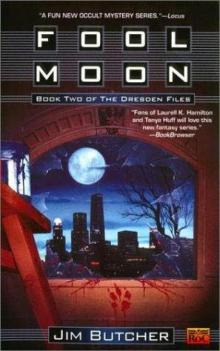 Fool Moon df-2
Fool Moon df-2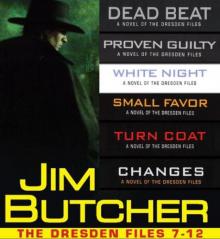 The Dresden Files Collection 7-12
The Dresden Files Collection 7-12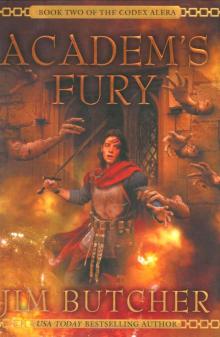 Academ's Fury ca-2
Academ's Fury ca-2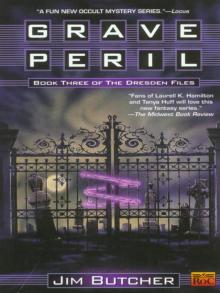 The Dresden Files 3: Grave Peril
The Dresden Files 3: Grave Peril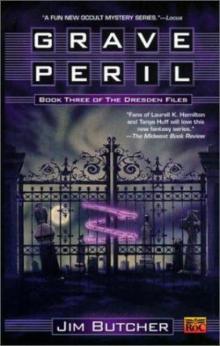 Grave Peril df-3
Grave Peril df-3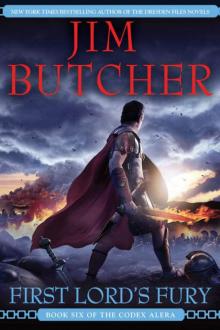 Codex Alera 06 - First Lord's Fury
Codex Alera 06 - First Lord's Fury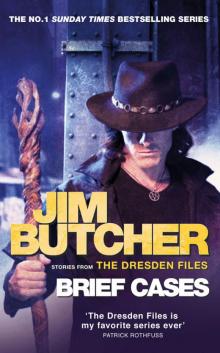 Brief Cases
Brief Cases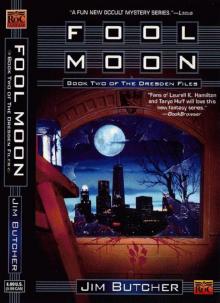 Dresden Files Book 02: Fool Moon
Dresden Files Book 02: Fool Moon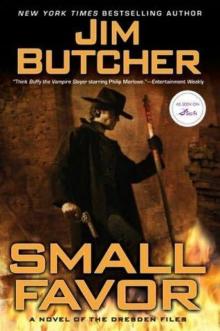 SMALL FAVOR tdf-10
SMALL FAVOR tdf-10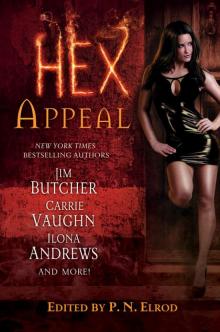 Bigfoot on Campus
Bigfoot on Campus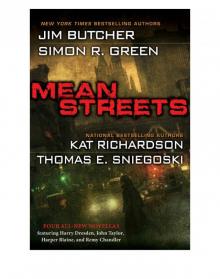 Mean Streets
Mean Streets Dead Beat df-7
Dead Beat df-7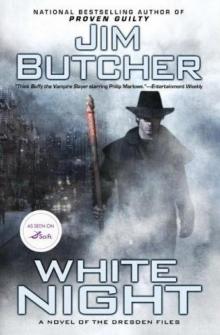 White Night df-9
White Night df-9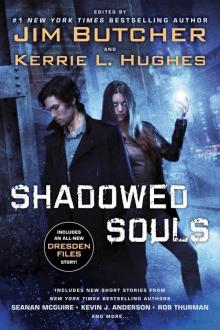 Shadowed Souls
Shadowed Souls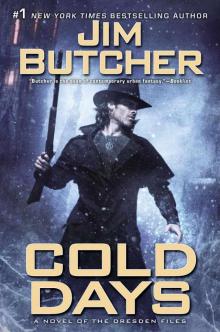 Dresden Files 14 - Cold Days
Dresden Files 14 - Cold Days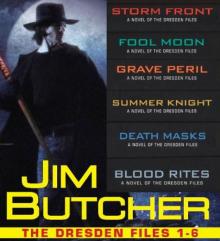 The Dresden Files Collection 1-6
The Dresden Files Collection 1-6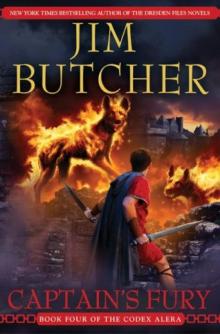 Captain's Fury ca-4
Captain's Fury ca-4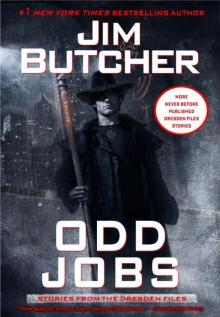 Odd jobs sftdf-2
Odd jobs sftdf-2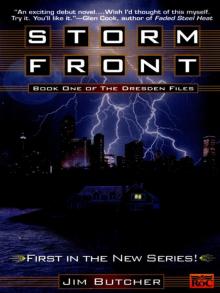 The Dresden Files 1: Storm Front
The Dresden Files 1: Storm Front Blood Rites df-6
Blood Rites df-6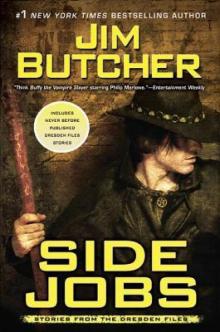 Side Jobs: Stories from the Dresden Files
Side Jobs: Stories from the Dresden Files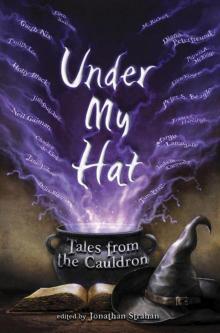 B is for Bigfoot
B is for Bigfoot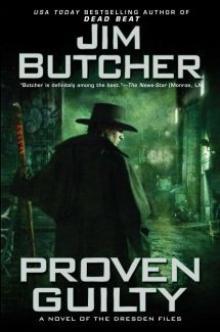 Proven Guilty df-8
Proven Guilty df-8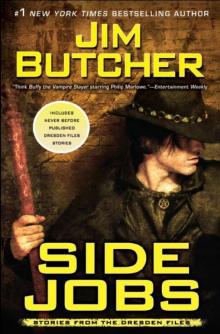 Dresden Files SSC01 - Side Jobs
Dresden Files SSC01 - Side Jobs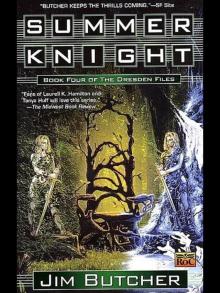 Summer Knight: Book Four of the Dresden Files
Summer Knight: Book Four of the Dresden Files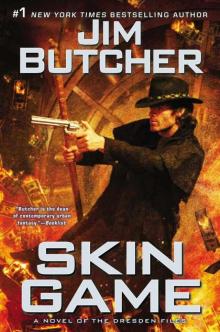 Skin Game: A Novel of the Dresden Files
Skin Game: A Novel of the Dresden Files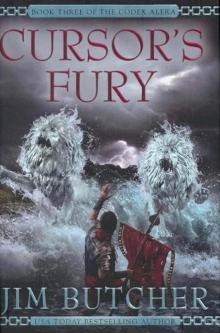 Cursors's Fury ca-3
Cursors's Fury ca-3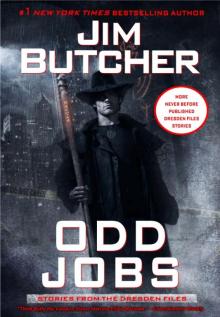 Dresden Files SSC02 - Odd Jobs
Dresden Files SSC02 - Odd Jobs Death Masks df-5
Death Masks df-5 Restoration of Faith (the dresden files)
Restoration of Faith (the dresden files)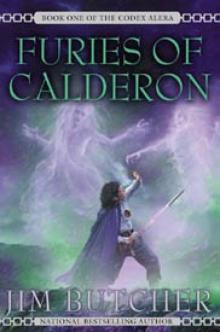 Furies of Calderon ca-1
Furies of Calderon ca-1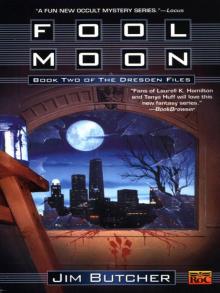 The Dresden Files 2: Fool Moon
The Dresden Files 2: Fool Moon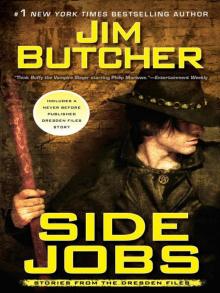 Dresden files:Side jobs (dresden files:short stories)
Dresden files:Side jobs (dresden files:short stories) I Was a Teenage Bigfoot
I Was a Teenage Bigfoot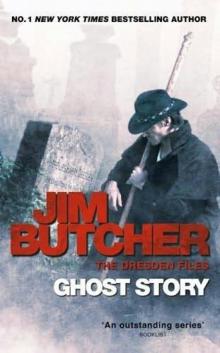 Ghost Story df-13
Ghost Story df-13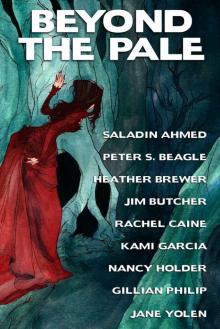 Beyond the Pale: A fantasy anthology
Beyond the Pale: A fantasy anthology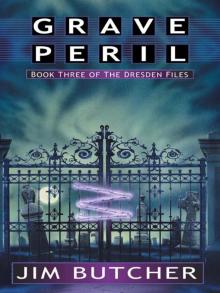 Dresden Files 03 - Grave Peril
Dresden Files 03 - Grave Peril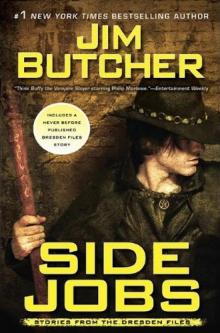 Side Jobs df-13
Side Jobs df-13